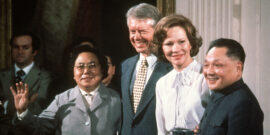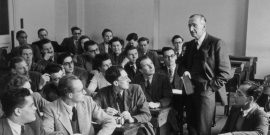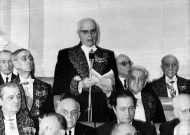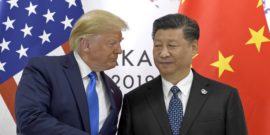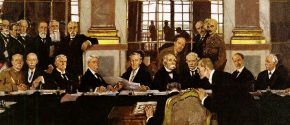Missing in the conversations about China’s future is the place of economic liberalism in modern Chinese thought before 1978.
Samuel Gregg
When economists lose interest in price theory, policymakers return to familiar mistakes.
Liberal thinkers used to be quite interested in this endeavor.
ESG severely compromises the ability of financial actors to price risk and allocate capital throughout the economy.
Friedrich Hayek stressed the limits of our knowledge and the need for humility to understand the economy.
If the marriage of modern capitalism and representative democracy cannot be healed, the West is in serious trouble.
Trade openness is a positive-sum enterprise through which all participants win—albeit to varying degrees and in different ways.
Classical liberal international theory rests on the twin pillars of prudence and realism.
A return to free trade will make America economically stronger and more influential on the world stage.
Neomercantilist policies would inflict considerable damage on the American economy and magnify our political dysfunction.
Neomercantilist policies remain politically attractive in spite of long-standing and powerful economic critiques of protectionism.
The seven crises of globalization studied by Harold James demonstrate that they were shaped by a heady mix of events, reactions, ideas, and choices.
Angus Deaton is concerned about inequality but doesn’t clarify why.
Ramón Díaz rescued liberal ideas from the obscurity into which they had fallen in Uruguay.
An asset manager considers the real consequences of socially conscious investing.
The profit motive—not ESG—will affirmatively promote freedom.
Ninety years ago today, Wilhelm Röpke confronted an audience in Frankfurt am Main about where Hitler was leading Germany.
In a courageous 1933 lecture, Wilhelm Röpke explained the value of liberalism—a message still worth considering today.
Hayek's deep curiosity about the world was matched by considerable courage and intellectual integrity.
Despite its recent setbacks, ESG is still a powerful movement that business leaders must confront.
ESG is conceptually incoherent, blurs ethics and business practices, and corrodes an understanding of the proper ends of commerce.
Market-friendly economists, historians, and philosophers will need new approaches in an age unfriendly to economic freedom.
Will the present crisis teach us the importance of central bank restraint?
Discredited mercantilist notions shape many of our present economic debates.
If one wants to avoid the pitfalls of integralist or progressivie statism, De Regno’s vision of politics has much to teach us.
The erosion of the bonds of Empire and Protestantism raises the question whether the United Kingdom will remain intact.
The word “statesmanship” doesn’t leap to mind these days when we think of places like Washington D.C., Jerusalem, Brussels, London, Paris, or Berlin.
It’s easy to understand why central bankers might succumb to a Masters-of-the-Universe mindset.
The first-generation of ordoliberals were focused on how to limit public and private power in order to create an economy that promotes liberty.
Conservatives who believe that the U.S. economy requires more active state intervention acquiesce to the political left.
When classical liberals gathered on Mont Pèlerin, they were in need of fresh thinking.
Once the inflation genie escapes from the bottle, it is extremely difficult to put it back.
U.S. industrial policy has a poor track record at sectoral diversification and creating new types of enterprises and employment.
There is a specter haunting Europe: a denigration of its cultural roots, and their replacement by an opaque sentimental humanitarianism.
The Federal Reserve reflects and embodies the deep dysfunctionality that characterizes the making of economic policy in America today.
Röpke looked for a liberalism purged of rationalist tendencies and infused with normative content reflecting Western civilization's accomplishments.
Wilhelm Röpke's case for the gold standard rested on more than economic arguments.
The fall of France in 1940 was America’s biggest foreign policy miscalculation in the twentieth century.
The German ordo-liberals may offer a path for reforming today's central banks.
Woke capitalism desires to exclude those who don't subscribe to the usual progressive orthodoxies.
Declining to hide behind sentimental humanitarian bromides, Benedict XVI calls for us to engage modernity fully in faith and reason.
Old truths need retelling if market economies are to persist and if humans are to prosper.
What took the Asian Tigers from the status of economic backwaters to first-world economies was economic liberalization and trade openness.
After Humanity brings clarity and light to The Abolition of Man's historical, literary, and philosophical context.
The gold standard’s history reminds us that not every economic challenge demands a centralized political solution.
The Gypsy Economist accounts for Colin Clark's journey from socialism to supply-side economics.
Central banks have contributed to serious macroeconomic problems while using their considerable discretion to fight financial fires.
American free traders should recognize that it is not enough to win the intellectual argument. They must also mobilize free trade sentiment.
Attention to civilizational questions may help us to grasp some of the reasons certain countries' policies reflect a consistency over time.
Rueff's writings demonstrate the economic and moral indispensability of sound monetary policy for stable long-term growth and basic honesty in policy.
Downplaying of the room for legitimate disagreement among lay Catholics about social and political questions is a mistake.
For all its weaknesses, Clash of Civilizations remains a text that can help us see the likely paths conflict will take in the 21st century.
Getting America’s own house in order is surely the sine qua non of any effort to deal with a resurgent and belligerent China.
Our understanding of how religious beliefs shape economic life and ideas remains fragile, tentative, and heavily driven by speculation and ideology.
As long as humans are human, some people will behave badly in business. But no cure should be worse than the sickness.
Conservative liberals didn’t hesitate to connect the principles and institutions underpinning market economies to the West’s civilizational foundations.
Embracing stakeholder capitalism on a global scale would only magnify the already-yawning gap between Davos man and everyone else.
Is America finally making its own way in a world becoming less liberal and in which the West’s saliency as a model for everyone continues to decline?
If we truly want to promote America’s common good, even more government intervention than we already have is probably not the way to do it.
Walter Eucken presented an ethical and economic objective for which economists could strive in an imperfect world.
Williams’ argument runs counter to how many today understand the Enlightenment movements which reshaped the European world from the late 17th century on.
Radical uncertainty—whether stemming from war, disease, or love of coffee—will always prevail.
The post-Goldwater conservative movement changed America’s ideological landscape. Today, that world seems very far away.
As confidence in the desirability of liberal order dwindles throughout much of the world, Huntington’s thesis appears to have come into its own.
As progressives understand better than most people, if you win the vision game, you likely win everything else.
Gregory Collins has written the definitive account of Burke’s economic thought.
Anyone who sits on the vast spectrum from the liberal-minded left through to conservative traditionalists should have no illusions about the woke.
Eighty years ago, France suffered perhaps the greatest humiliation in its history, and de Gaulle rallied the nation to continue the fight.
Pinochet would be celebrated if his accomplishments had not been realized by a regime which had deployed savage methods against its opponents.
Berman believes that Europe’s post-war democratization reflects many lessons learned from the continent’s bloody first 50 years of the twentieth century.
Is it really in America’s long-term economic interest to disengage from a market of 1.4 billion people and one of the world's largest economies?
In a culture in which social trust is widespread, entrepreneurship and free exchange become more plausible and sustainable.
One Brexit effect is that the nation from which the Anglosphere ultimately derives is reassessing many of its most important relationships.
American policymakers and citizens should acknowledge that the benefits promised by economic nationalism are illusory.
He could be relied upon to explain clearly and patiently why there is something called Western Civilization and why it should be studied and bolstered.
The attraction of such policies is their promise of immediate action to reverse economic decline and promote national greatness, but do they deliver?
Attempts to distance peoples completely from their national cultures were bound to produce unpredictable consequences.
Jacques Rueff was notoriously unafraid to speak economic truth to politicians of all persuasions—and we should heed his insights.
Soft corporatism’s underlying assumption is that government officials and technical experts should play a major role in shaping the economy.
Rather than seeking to submerge economics into Thomistic inquiry, present-day dissatisfaction with economics might be better taken in another direction.
Anyone seeking to claim Edmund Burke’s mantle should recognize the depth of his commitment to economic freedom.
Sam Gregg explores how the West is built on the union of the God of the Philosophers and the God of the Bible.
Patriotism and economic liberty are not mutually exclusive. Commercial republicanism can unite them.
The book which propelled John Maynard Keynes to fame 100 years ago continues to shape our world today.
With a No-Deal Brexit, Britain would be facing the prospect of full self-government, with all the freedom and accountability that go along with this.
The Kantian dream of undoing real nations keeps foundering on the shoals of human nature's need for real attachments to place.
If sovereign states ordered their domestic affairs in accordance with principles of natural law, the international sphere would benefit greatly.
A conservative politics faithful to its Burkean heritage must be rooted in more than an emphasis on prudence or skepticism: it needs natural law.
The present upheaval engulfing France reflects far deeper and unresolved tensions within.
Between 1776 and 1815, Britain was at peace for just 10 years, and reading the Scottish defense of free trade without this in mind is a mistake.
Free traders should seize the mantle of patriotism and love of nation from protectionists.
It’s the supranational institutions, unrepresentative and unaccountable, that tend to do the opposite—and that spur destructive forms of nationalism.
The man who combined the conservative’s emphasis on order with the classical liberal’s attention to liberty.
In Islam: A Chronological Record, Fr. James V. Schall uncovers the West's ideological helplessness.
They triumphed over the interventionist and collectivist economic policies that had been endemic in Germany since before the First World War.
The liberal order depends upon natural law, and integralist critics of liberalism make a mistake in viewing natural reason as a political liability.
These are the Hamilton texts to read to master the foundations of America’s economic success story.
A disconnectedness from reality seems to have become the norm in parts of the Holy See—or at least a tendency to view the world through a leftist lens.
Rueff considered Keynes’s ideas to be counterproductive because they gave governments excuses to avoid responsibility
Samuel Gregg discusses the anti-Keynsian fusionist everyone should know: Wilhelm Röpke.
Samuel Gregg is the Friedrich Hayek Chair in Economics and Economic History at the American Institute for Economic Research, and Contributing Editor at Law & Liberty. The author of 16 books—including The Commercial Society (Rowman &Littlefield), Wilhelm Röpke’s Political Economy (Edward Elgar), Becoming Europe (Encounter), Reason, Faith, and the Struggle for Western Civilization (Regnery), and most recently, The Next American Economy: Nation, State, and Markets in an Uncertain World (Encounter), as well as over 700 essays, articles, reviews, and opinion-pieces—he writes regularly on political economy, finance, American conservatism, Western civilization, and natural law theory. Two of his books have been listed for Conservative Book of the Year and one has been listed for the Hayek Prize. He is an Affiliate Scholar at the Acton Institute. He can be followed on Twitter @drsamuelgregg
